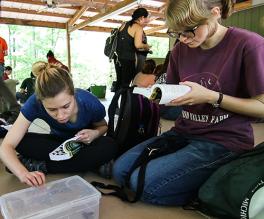Zoology Major Program

The Zoology Major requires a minimum of 30 semester hours consisting of four core courses (evolution, ecology, organismal diversity, and general genetics), one course in biodiversity, two courses in organismal biology, and electives. In addition to courses in the major, prerequisite/supporting courses are required in introductory biology, mathematics, inorganic and organic chemistry, physics, and statistics. These courses do not count towards the 30 hours in the major. Courses that can count as electives in the Zoology Major include any course taught in EEOB at or above the 2000 level, as well as such courses as Animal Sciences 3130, 3140, Anthropology 3300, 3304, Biology 3401, Biochemistry 4511, 5613, 5614, Earth Sciences 3315, 4501, Microbiology 4000, 4100, and Psychology 3313, 5601. Additional courses can be approved as electives by the zoology advisor, Sue Ellen Dehority (dehority.2@osu.edu), or the honors zoology advisor, Dr. Lisle Gibbs. The minimum acceptable grade in any course counting in the major is C-, and the average grade of courses counting in the major may not be lower than a C (2.00). In the required supportive courses (math, physics, etc.) a D is minimally sufficient.

Recommendations for students planning on graduate study
The Zoology Major satisfies the minimal requirements for most graduate programs in biology, but additional courses might be recommended, depending on the graduate program a student anticipates entering. It is usually wise to take a computer-based course in statistics. Additional chemistry or physics may also be advisable, depending on your intended area. Students planning to attend graduate school should discuss their plans with their Zoology advisor.
Recommendations for pre-professional students
Many professional programs require a full year (2 semesters) of organic chemistry, whereas the zoology major requires only one (Chem 2310), so you’ll need to take the 2-semester sequence (Chem 2510 & 2520) instead. Some professional schools also require that you take the laboratory portion of organic chemistry (Chem 2540 & 2550). Other courses that are often required by professional programs, such as microbiology (Microbio 4000) or biochemistry (Biochem 4511), can count towards the 30 hours of the zoology major as electives.
